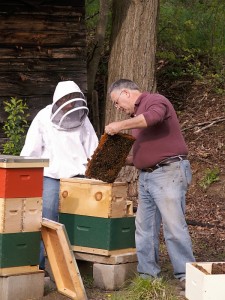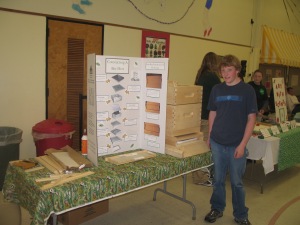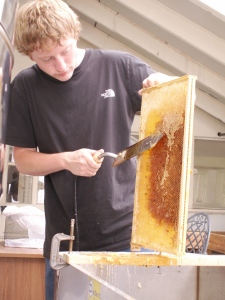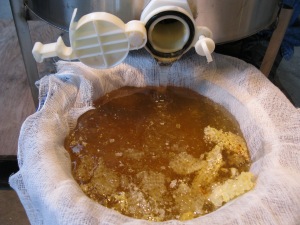Filed under: Uncategorized
Drew Harding grew up in Barre Town, Vermont on a small 36 acre gentleman’s farm. Strongly connected with the land, he is a true steward.
At the age of 15 this strong connection fed his desire to establish a small apiary for the purpose of pollination and honey production. His property consists of apple trees, berry bushes and fields of wild flowers. This desire has since turned into a passion and then a question: “Can I turn this passion into a profitable return?” In the winter of 2010 Drew attended Beekeeping Classes with Bill Mares of the Vermont Beekeepers Association. At the completion of this course his goal was to build 2 hives and purchase 2 nucs from Mike Palmer, a beekeeper from St. Albans, Vermont. A nuc is a 4 or 5 frame bee colony containing various stages of growth or development. This nuc is then typically transferred into a 10 frame Langstroth hive.

John Mailloux mentors Drew Harding at his bee farm. During the 1950s John’s father had the largest bee farm in New England
Drew had the confidence to get his hives established, but felt the need to connect with a mentor which would allow him to continue his education. He feared finding caskets of dead bees instead of thriving colonies, expanding and producing honey. Drew connected with John Mailloux, a veteran beekeeper from Williamstown, Vermont. How much did he invest? Drew’s initial investment was two unassembled Langstroth hives. The components of each hive consisted of two brood boxes, 20 deep frames with bees wax foundation, hive stand, slatted rack, verroa screen, inner cover, and an outer telescoping cover. Each of these hives cost approximately $190.00. The two nucs were $250.00. Drew constructed these hives in the basement at his home.
Drew’s mom Alice knew that if Drew was going to establish a small apiary, he would need hands on experience. As a 4-h volunteer with Carol Fleck of a horse club, Alice was enjoying the experience and fun her two daughters were having in their horse club experience. She was now going to bat for Drew. My phone rang. It was Alice. She explained Drew’s interest in bees and was wondering if I had any contacts for bee producers who would be interested in working with youth.
In a few weeks I would ask Steve Parise of the Vermont Bee Keeper’s Association if I could have a minute to introduce myself at their Annual Bee Keepers meeting that took place at the Vermont Farm Show at the Barre Auditorium. The meeting attracted more than 150 bee keepers state wide. Just before their pot luck lunch, I had introduced myself as the 4-H Educator of Washington and Orange Counties. I invited any bee keeper to meet me in the lobby at the break to discuss how they could work with youth. Seven beekeepers met me in the lobby. One of them John Mailloux. John lived within 20 minutes of Drew and he had lots of experience with honey production.
During the 1950’s, John’s father had one of the largest apiaries in New England consisting of nearly 1000 hives. Since then his apiary has declined. John’s love for bee keeping inspired him to attend workshops to get up to date on the latest methods for honey production and to start his own apiary – more as a hobby. He was happy to share his hands on experience with Drew. At the Berlin UVM Extension Office, I set up a meeting with Drew, Alice and John.
We talked about goals: Drew would enroll as an independent 4-H member with John as his mentor. Drew goals: he would work with John at his apiary; Build and maintain two hives; Harvest 100 pounds of honey; Study and review certain parts of the 4-H Bee Curriculum; Explore the ecology of bees and how they account for 80% of our food production; Explore diseases and the current research that link genetically modified organisms to the break down the bees membrane and cause death; Colony Collapse Disorder (CCD); Present at our 4-H Regional and State Day communications event. Drew avoided public speaking opportunities. His shy nature was best fitted with a table top presentation. During the summer of 2010, John showed Drew the basics of bee keeping. Drew caught on quickly.
John recalled how important it was for Drew to get comfortable with the bees. “I showed Drew how to not wear gloves. You have to be able to let the bees walk on you. You have to be that comfortable.”John taught Drew skills that would inspire him to produce more honey during the next two years; proper feeding techniques and how to make sure you have enough space in the hives for the bees to increase in volume without swarming. If the bees feel their space is limited they will leave the hives and swarm. By October 2010, Drew reached his goal of harvesting 100 pounds of honey. His net profit was an approximate $250.00.
In the winter of 2011, Drew became more independent. With the knowledge he now had he was able to manage his hives and feed the right consistency of sugar and water when needed to get his bees through a cold winter. During the winter, Drew found an on-line beekeeping chat group through Yahoo. Members focused on either asking questions or provided advice. Drew became a frequent visitor, contributing advice or information. On one particular evening Drew was assisting an individual into the early morning hours. Drew continued to expand his knowledge of beekeeping by attending workshops sponsored by the Central Vermont Beekeepers’ Club and webinars offered through Brushy Mountain Beekeeping. These educational opportunities allowed him to become knowledgeable in creating nucs, divisions, assessing colonies for a variety of reasons including disease control and prevention of swarms. He and John stayed in touch and exchanged experiences, but for the most part Drew was now solo.
By the end of the summer of 2011 Drew had extracted 160 pounds of raw honey. He sold everything he produced. In the winter of 2012, Drew was a senior in High School. He added 2 more hives which brought his total number of hives up to 6. At a workshop offered by Mike Palmer of St. Albans Drew learned the in’s and out’s of creating his own nucs. He purchased two queens and by dividing two of his strong hives, created two nucleus colonies. His new hives survived the winter. By not having to purchase two nucs, he saved $220.00.
2012 was a banner year for nectar flow. Drew worked his hives on a regular basis, monitoring their build up and providing them plenty of room to expand. “I had strong colonies, and I was always making sure I stayed ahead of their expansion by giving them room to grow.” During the summer of 2012, Drew took on mentoring Dave Martineau, an individual from Washington, Vermont interested in beekeeping as a hobby. In addition to this mentorship he offered advice and assistance to others. The knowledge he had gained from John, he was now sharing with others.
By the fall of 2012, Drew harvested 623 pounds of raw honey from his small apiary, consisting of 6 hives. He knew selling this amount of honey locally would be challenging. John Mailloux referred Drew to City Market in Burlington, Vermont. After meeting with Michael Thomas and Lynn Ellen at City Market, they negotiated a price for his honey. Drew would be selling his raw honey to City Market, providing 3 different size quantity jars. As of March 2013, Drew has sold approximately 250 pounds of honey wholesale to City Market and approximately 200 pounds retail.
In the fall of 2012 Drew entered his first year of college at the University of Maine, majoring in Wildlife Ecology with a minor in animal science. His parents, Alice and Charlie Harding have taken over the management of his hives in his absence. In January of 2013 Drew experience his first hive loss. He lost 2 of his 6 hives. His goal for the spring is to create 2 splits from his existing hives, replacing the lost hives with his own stock. Upon returning from college in May, Drew has plans to attend a queen rearing workshop in which he hopes to learn the process of raising his own queens this spring. In addition to these 2 splits he will plan to purchase 2 nucs from Josh White, of Northwood Apiaries in Northern Vermont.
In just a few years, Drew’s dream of establishing his own apiary has become a reality through a partnership of a parent, mentor and 4-H Educator. He learned the ropes from John Mailloux who mentored him on the basics. Independently, he continued to expand his knowledge by attending webinars and workshops which gave him the knowledge to successfully expand and maintain his own colonies of honey bees. This experience has allowed him to become a much better communicator by giving presentations, contributing to on-line forums and sharing his knowledge with novice beekeepers. His profound respect for the environment was the driving force behind his quest. It has also led him to greater understanding of the challenges and threats that face the honey bee population and how critical these natural pollinators are to the sustainability of our food sources and the land on which that food is produced.
Leave a Comment so far
Leave a comment


